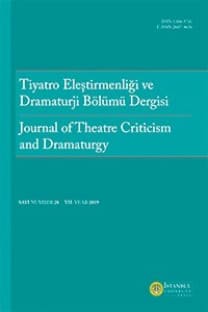Nathan Ellis'in Oyunu Work.Txt'de Medyanın İzleyici ve Metin Üzerindeki Rolü
Bu makale, medya ve medya araçlarının Nathan Ellis'in Work.Txt (2022) oyunu üzerindeki etkisini ve bu tür oyunların yenilikçi teknik araçlar kullanarak geleneksel formları deneyimsel formlara nasıl dönüştürdüğünü incelemeyi amaçlamaktadır. Ellis'in medya ve medya-performans ilişkileri kavramına odaklanan oyunu, teknolojik olarak gelişmiş bir toplumla bağlantılı olarak izleyicilere oyunların tasvirindeki değişikliklere atıfta bulunur. Geniş anlamda medya, televizyon, radyo, basılı yayın ve internet gibi gönderici ve alıcı arasında bilgi ileten iletişim modlarını ifade eder. Medya kullanımı seyircinin algısını değiştirir ve onları performanslara aktif olarak katılmaya teşvik eder. Bu makale, medya ve deneyimsel yöntemlerin bir sonucu olarak performansların yapısındaki ve bağlamındaki değişiklikleri tanımlamak için medya kavramını kullanır. Öte yandan, bu çalışma, çağdaş öznenin yabancılaşmasının dolayımlı olarak çevre ve toplum tarafından nasıl şiddetlendiğini araştıracaktır. Nathan Ellis'in Work.Txt adlı oyunu, performansta bireyleri (seyirciyi) kullanarak ve birbirlerine ne kadar yabancı olduklarını göstererek günümüzün yabancılaşmış bireylerini temsil etmeye çalışır.
Anahtar Kelimeler:
Nathan Ellis, Work.Txt, Medyanın Rolü, Seyircinin Katılımı, Deneyimsel Performans, The Role of Media, Audience Participation, Experiential Performance
The Role of Media on the Audience and Text in Nathan Ellis’ Play Work.Txt
This article seeks to study the impact of media and mediatic tools on Nathan Ellis’ play Work.Txt (2022) as well as how such plays have transformed conventional forms into experiential forms using innovative technical means. Ellis’s play, which centres on the concept of media and media-performance relationships, alludes to changes in the portrayal of plays to audiences in connection to a technologically advanced society. In a broad sense, media refers to modes of communication that convey information between sender and recipient, such as television, radio, print and the internet. The usage of projection, internet and print alters the audience’s perception and encourages them to actively engage in the performances. This paper uses the notion of media to describe changes in the structure and context of performances as a result of media and experiential methods. On the other hand, this study will explore how the contemporary subject’s alienation is exacerbated by the mediated environment and society. Nathan Ellis’s play Work.Txt attempts to represent today’s alienated individuals to each other by employing individuals (the audience) in the performance and demonstrating how estranged they are from one other.
Keywords:
Nathan Ellis, Work.Txt, The Role of Media, Audience Participation, Experiential Performance,
___
- Adam, R. Kate. ‘Contemporary theatre and the experiential.’ The International Journal of the Arts in Society. Vol. 5, No. 4 (2010): 153-164. google scholar
- Bennett, Susan. The Role of The Theatre Audience: A Theory of Production and Reception. McMaster University, PhD, 1988. google scholar
- Boenisch, Peter. ‘Aesthetic Art to Aisthetic Act: Theatre, Media, Intermedial Performance’, in Mapping Intermediality in Performance, ed. by Sarah Bay Cheng et al., 2006: 103-116. google scholar
- Bourriaud, Nicolas. Relational Aesthetics. London: Les Presses du Reel, 2002. google scholar
- Cheng, Sarah Bay, Starbuck, Jennifer Parker and Saltz, David Z.. Performance and Media Taxonomies for a Changing Field. USA: University of Michigan, 2018. google scholar
- Ellis, Nathan. Work.Txt. London: Methuen Drama, 2022. google scholar
- Etchells, Tim. Certain Fragments: Contemporary Performance and Forced Entertainment. London: Routledge, 1999. google scholar
- Flusser, Vilém. ‘The Future of Writing,’ in Writings, ed. Andreas Ströhl, Minneapolis: University of Minnesota Press, 2002. google scholar
- Freshwater, Ellen. Theatre and Audience. Bloomsbury, Methuen Drama, 2021. google scholar
- Garcia, Cristina Delgado. Rethinking Character in Contemporary British Theatre, DeGruyter, 2015. google scholar
- Hayles, Katherine N. How We Became Posthuman: Virtual Bodies in Cybernetics, Literature, and Informatics. Chicago: Chicago University Press, 1999. google scholar
- Ilter, Seda. ‘Rethinking play texts in the age of mediatization: Simon Stephens’s Pornography.’ Modern Drama, Vol. 58, No. 2, (2015): 238-262. google scholar
- Jürs-Munby, Karen. ‘Introduction’, in Postdramatic Theatre, by Hans--‐Thies Lehmann, London: Routledge, 2006. google scholar
- Kattenbelt, Chiel. ‘Intermediality in Theatre and Performance: Definitions, Perceptions and Medial Relationships.’ Cultura, Lenguaje Y Representación / Culture, Language AND Representation, Vol. 6, (2008): 19-29. google scholar
- Klich, Rosemary, and Edward Scheer. Multimedia Performance. London: Palgrave Macmillan, 2012. google scholar
- McMillan, Joyce. “Edinburgh Fringe theatre review: Work.txt by Nathan Ellis”. The Scotsman, 2020, https://www.scotsman.com/arts-and-culture/edinburgh-festivals/edinburgh-fringe-theatrereview-worktxt-nathan-ellis-2947170. Accessed 25.07.2022. google scholar
- Lehmann, H. Thies. Postdramatic Theatre. London:Routledge, 2006. google scholar
- Pavis, Patrice. Dictionary of Theatre: Terms, Concepts, and Analysis. Toronto: Toronto University Press, 2003. google scholar
- Phelan, Peggy. Unmarked: The Politics of Performance. London: Routledge, 1993. google scholar
- Ranciere, Jacques. ‘The Emancipated Spectator’. Artforum International 45, no.7 (2007): 271-80. google scholar
- Rayner, Alice. ‘The Audience: Subjectivity, Community and The Ethics of Listening’. Journal of Dramatic Theory and Criticism 7, no.2 (1993): 3-24. google scholar
- Reason, Matthew. ‘Participations on Participation: Researching the ‘active’ theatre audience’, Journal of Audience and Reception Studies 12, no.1 (2015): 271-80. google scholar
- Savran, David. Breaking the Rules: The Wooster Group. New York: Theatre Communications Group, 1988. google scholar
- Shepherd, Simon. Theatre, Body and Pleasure. London: Routledge, 2006. google scholar
- Wild, Stephi. “WORK.TXT Comes to Edinburgh Fringe Next Month”. Broadway World Scotland, 2022, https://www.broadwayworld.com/scotland/article/WORKTXT-Comes-to-Edinburgh-Fringe-Next-Month-20220715. Accessed 30.07.2022. google scholar
- White, Gareth. ‘On Immersive Theatre’, Theatre Research International 37, no. 3 (2012): 221-235. google scholar
- White, Gareth. Audience Participation in Theatre: Aesthetics of the Invitation. Basingstoke: Palgrave, 2013. google scholar
- Wood, Claire. “Work.Txt (Online)”. The Wee Review, 2021, google scholar
- https://theweereview.com/review/work-txt-online/. Accessed 16.09.2022. google scholar
- ISSN: 1303-8605
- Yayın Aralığı: Yılda 2 Sayı
- Başlangıç: 2002
- Yayıncı: İstanbul Üniversitesi
Sayıdaki Diğer Makaleler
Bir Geleneğin Çevirisi: Tanzimat Dönemi Türkçe Molière Çevirilerinde Osmanlı Halk Tiyatrosu Öğeleri
Nathan Ellis'in Oyunu Work.Txt'de Medyanın İzleyici ve Metin Üzerindeki Rolü
Mine Söğüt’ün Beş Sevim Apartmanı Romanının Tiyatro Uyarlamalarına Çeviribilim Perspektifinden Bakış
Kamyon Oyununda Yabancılaşma ve Gündelik Hayat Ritimleri
Melike BOZDOĞAN, Özge BOZDOĞAN
Tiyatro Alanında Bilimsel Yayınlar: Uluslararası Tiyatro Çalışmalarının Bibliyometrik İncelemesi
Eski Yunan Tiyatrosu ve Agon Kültürü
İran Tiyatrosu’nda Modern Bir Matem Töreni: Şehr-i Kıssa
Tamer Can ERKAN, Hakkı Alper MARAL
Oyun Metinlerinde Ritim ve Bir Örnek Olarak Molière’in Cimri’sinin Ritimanalizi
